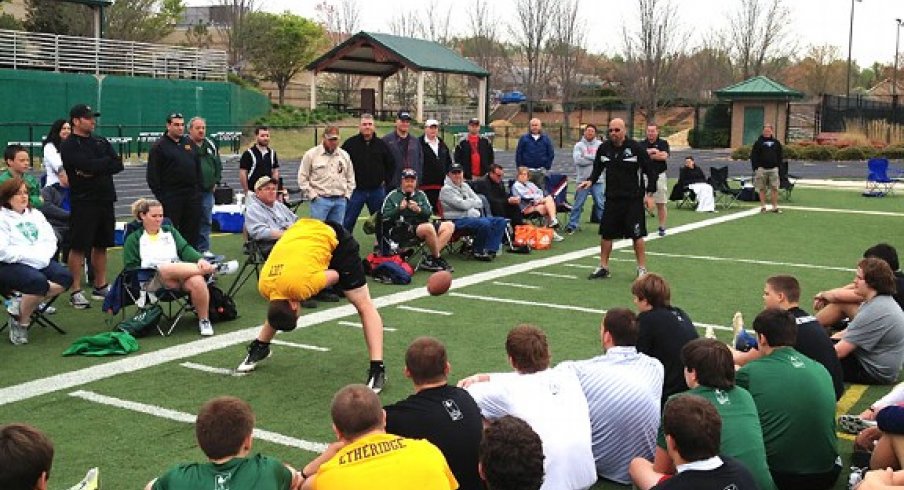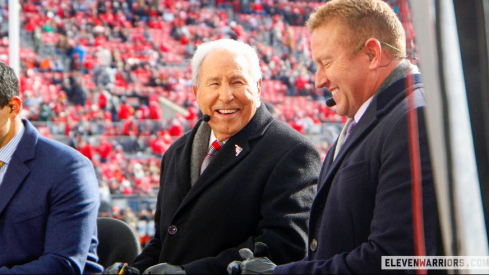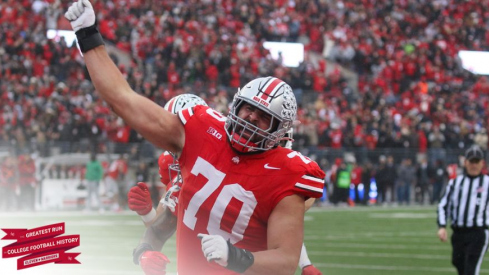When Chris Rubio held his first long snapping camp in Las Vegas, there were eight attendees. Twelve years later, that number swelled to 275. It’s not just offense that’s exploding in college football, special teams – and to a bigger extent long snappers – has taken on an added importance from head coaches.
Ohio State, Alabama and Notre Dame have all offered scholarships to long snappers out of high school the past two years. The Buckeyes are one of the ringleaders in the rise of long snappers. Jim Tressel offered Bryce Haynes a scholarship in 2011.
“Coaches are starting to realize, ‘Why wouldn’t I take a long snapper?’” said Rubio, the founder of Rubio Long Snapping. “It’d be like if you could recruit a quarterback who all he did was convert third downs. If you were a coach, you would take him. Essentially, that’s what you’re doing with a long snapper. You can flip the field with a good snap, good kick and good coverage team. It’s one less thing a coach has to worry about.”
Gaining attention as a long snapper usually comes when you do something bad. It’s the ultimate don't be seen or heard position. So standing out when you do well is difficult. You can’t just throw a touchdown pass or run for 150 yards.
Liam McCullough, the nation’s No. 2-ranked long snapper, would have coaches contacting him daily if he played a different position. But the usual recruiting philosophy doesn’t pertain to long snappers. They often must sell themselves, sending highlight videos to coaches and cold calling recruiting coordinators.
McCullough was fortunate to receive a handful of scholarship offers, though one stuck out. In February, Meyer extended an offer in McCullough’s direction. Accepting was a no-brainer, but only after considering all his options.
McCullough chose the Buckeyes over Michigan State, Wisconsin and Kentucky. A big factor in his decision was academics.
“I’ve always been an Ohio State fan, but wherever I ended up, I wanted to be 110 percent sure I wanted to be there,” he said. “I didn’t want to have any regrets. I took a lot of academic visits this past year, seeing everything but football. Academics are incredibly important to me. You’re only going to be playing football a quarter of the year. That was a big thing for me, weighing each of the schools and making sure I wanted to be there. That’s what I found in Ohio State.”
More than 20 percent of the 128 FBS teams have scholarship long snappers who were extended their offers out of high school. Ninety-six long snappers in the Class of 2014 have been offered scholarships or preferred walk-on positions, thought to be a record. Chances are it will stand one year. Already, the Louisiana Techs, Tulanes and Wyomings are joining the top programs in the country in offering long snappers.
“It’s smart. If the big dogs are doing it, everyone else will do it,” Rubio said.
He believes a day will come where recruiting classes consistently include long snappers.
“A long snapper is like a Honda Accord, it’s not the flashiest, but it’ll get you from Point A to Point B,” Rubio said.
Said McCullough: “I’ve always known that this is a position of value and is needed on a football team. It’s not just something you can teach a backup lineman or second-string whatever. A bad snap can lead to a blocked punt or missed field goal, which in turn, could cost you a game. Big-time college football coaches, such as Urban Meyer, are realizing this and recruiting the position more heavily.”
Still, there are holdouts. Coaches are aware a bad snap can be the difference in winning and losing, but some see value in handing out scholarships at other positions. Rubio, who was a long snapper at UCLA from 1994-97, said coaches’ opinions have shifted dramatically since his playing days.
There was a time when offering a long snapper out of high school was unheard of. The position also wasn’t specialized. Linemen were converted and given pointers on how to snap the ball. Now, players are beginning to snap in the early stages of their careers.
McCullough got his start in fifth-grade youth football. He was good and enjoyed it, leading him to take on the position each season. As a high school freshman, McCullough attracted the attention of Worthington Kilbourne head coach Vince Trombetti. Soon after fall camp commenced, Trombetti sensed he had a special player on his roster and moved McCullough to the varsity.
“That’s when I really realized I had a talent for long snapping,” McCullough said.
The next step was the same many aspiring long snappers are taking – seeking out a coach who could further his development. That led McCullough to Rubio, who refined his skills and turned McCullough into one of the top deep snappers in the country.
“He passes the eyeball test very quickly,” Rubio said. “He’s built very well and he’s one of those kids that keeps on improving. I’ve worked with him 30 times and he’s improved every time. He’s someone you want.”
Coaches want players who can get the ball to the punter or holder in .75 seconds or less. McCullough consistently hits the upper six-hundredths of a second. He’s also familiar with pressure. For specialists, they have to be perfect every time they’re on the field. That’s not the case for quarterbacks, wide receivers and running backs.
Rubio compares being a long snapper to being a closer in baseball. The responsibilities are singular and burdensome. One tiny blemish can put a catastrophic result in motion.
“It’s like being an assassin or a sniper – you have one job and you might have to wait around all day, but when you do, it better be perfect,” Rubio said. “A quarterback can have eight touchdowns and two interceptions in one game and be an All-American. If Liam has eight good snaps and two bad snaps, he would be fired.”
Camps have segments meant to simulate pressure-packed moments. Rubio will pull all the campers and attendees into a central area – sometimes upwards of 300 people – and have long snappers perform.
“There is an immense amount [of pressure] when it comes to specialists,” McCullough said. “Any other position, if they have a bad play, they have many other plays to fix it. Long snappers, kickers and punters, if they mess up, it’s the one shot that you get. As a long snapper, you don’t necessarily want people to know your name. If they know your name, it means you messed up.
“When you snap in front of a big crowd, it’s like white noise. Everyone is cheering, and you can block it out where it’s just you, the punter and the returner.”


